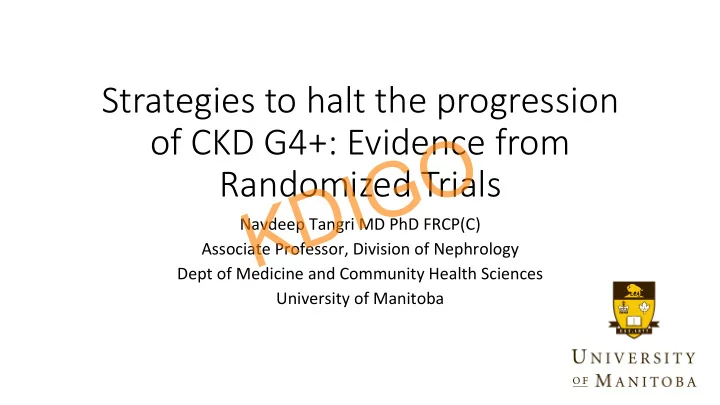

Strategies to halt the progression KDIGO of CKD G4+: Evidence from Randomized Trials Navdeep Tangri MD PhD FRCP(C) Associate Professor, Division of Nephrology Dept of Medicine and Community Health Sciences University of Manitoba
Disclosures • Research Support KDIGO • Astra Zeneca Inc • Honoraria • Otsuka Inc • Advisory Board • Viewics Inc
Outline • Evidence gap in CKD G4+ KDIGO • Available evidence for the following intervenQons • Bicarbonate • Uric Acid ReducQon • ACE/ARB • Phosphate Binders
Evidence Gap • PaQents with CKD Stages G4-5 are oUen excluded from randomized KDIGO trials in the general populaQon • Very few posiQve trials exist in paQents with kidney failure • Difficult to extrapolate findings from CKD Stage G1-G3A and from paQents on dialysis
Bicarbonate – Treatment of Met Acidosis • Metabolic acidosis is common in paQents with advanced CKD KDIGO • PaQents with diabetes may be at addiQonal risk • Prolonged metabolic acidosis can lead to bone loss and impaired muscle funcQon • Clinical pracQce guidelines recommend bicarbonate supplementaQon at levels < 22 mEq/l SusanQtaphong et al. AJN 2012
Evidence for Alkali Therapy in CKD KDIGO
Evidence for Alkali Therapy KDIGO
Evidence for Alkali Therapy • Largest trial – Debrito-Ashurst et al. KDIGO • Mean eGFR 20 ml/min, mean HCO3 – 20 mEq/l • Bicarbonate dose – 22 +/- 10 mEq/day • Pooled EsQmates • Slight increase in DBP 2.8 mm Hg • Increase in sodium excreQon (24 mEq/day) • Decrease in serum potassium (0.7 mEq/L)
Uric Acid ReducJon • Uric acid levels are strongly and consistently associated with CKD and KDIGO CVD in observaQonal studies • Uric acid reducQon in paQents with normal kidney funcQon may lead to improvements in blood pressure control • Randomized controlled trial evidence in paQents with advanced CKD remains scarce Kanji et al. BMC Nephrology 2015
Evidence for Uric Acid ReducJon KDIGO
Evidence for Uric Acid ReducJon KDIGO
Evidence for Uric Acid ReducJon KDIGO For eGFR – A change of 3 ml/min over follow up was detected
ACE/ARB in advanced CKD • Mainstay of treatment to prevent CKD progression KDIGO • Landmark studies enrolled paQents with earlier stages of CKD • Efficacy may be modified by presence of proteinuria • Safety may be modified by age
Landmark Trials • RENAAL KDIGO • Mean eGFR 38 ml/min, PaQents with Cr > 3.0 mg/dl excluded • IDNT • Mean eGFR 43 ml/min, PaQents with Cr > 3.0 mg/dl excluded • REIN study • NondiabeQc kidney disease, CrCl 20-70, mean eGFR 45 ml/min • Baseline proteinuria > 3 g/day
Landmark Trials KDIGO • Jafar et al. JASN 2007
STOP ACEI Trial • MoQvated by recent findings from ONTARGET and TRANSCEND KDIGO • Aims to enroll 410 paQents with CKD Stages G4-G5 from 15 UK based Pre Dialysis Clinics • 3 years of follow up • StraQfied enrollment to ensure balance in proteinuria and CKD Stage • Measurement of appropriate clinical and surrogate endpoints
Phosphate Binders • Hyperphosphatemia is associated with early mortality in the general KDIGO populaQon and in paQents on dialysis • High phosphorous and low calcium levels are associated with progression to kidney failure • Phosphate loads in the presence of reduced kidney funcQon can lead to FGF23 expression, which may have downstream CV effects
Evidence for phosphate binders • Two recent meta analyses suggesQng non-calcium binders may be KDIGO associated with improved survival • Evidence is largely from dialysis trials • Smaller trials with surrogate outcomes have been performed in the CKD populaQon
Evidence for phosphate binders • Block et al. – JASN 2012 – Calcium and non-calcium binders vs Placebo KDIGO • N=148 • No effect on FGF23, slight increase in CAC with binders • Independent Study – De Iorio et al. CJASN 2013 – Sevelamer vs Calcium Carbonate • N=212 • 50 % RelaQve risk reducQon in death or dialysis • Two small recent studies on ferric citrate – short follow up (<12 weeks)
Summary • Limited high quality evidence exists for medical intervenQons to halt KDIGO the progression of CKD Stage 4+ • Most randomized trials from the general populaQon do not include these paQents • Dedicated large simple randomized trials should be performed to confirm these preliminary findings
Recommend
More recommend